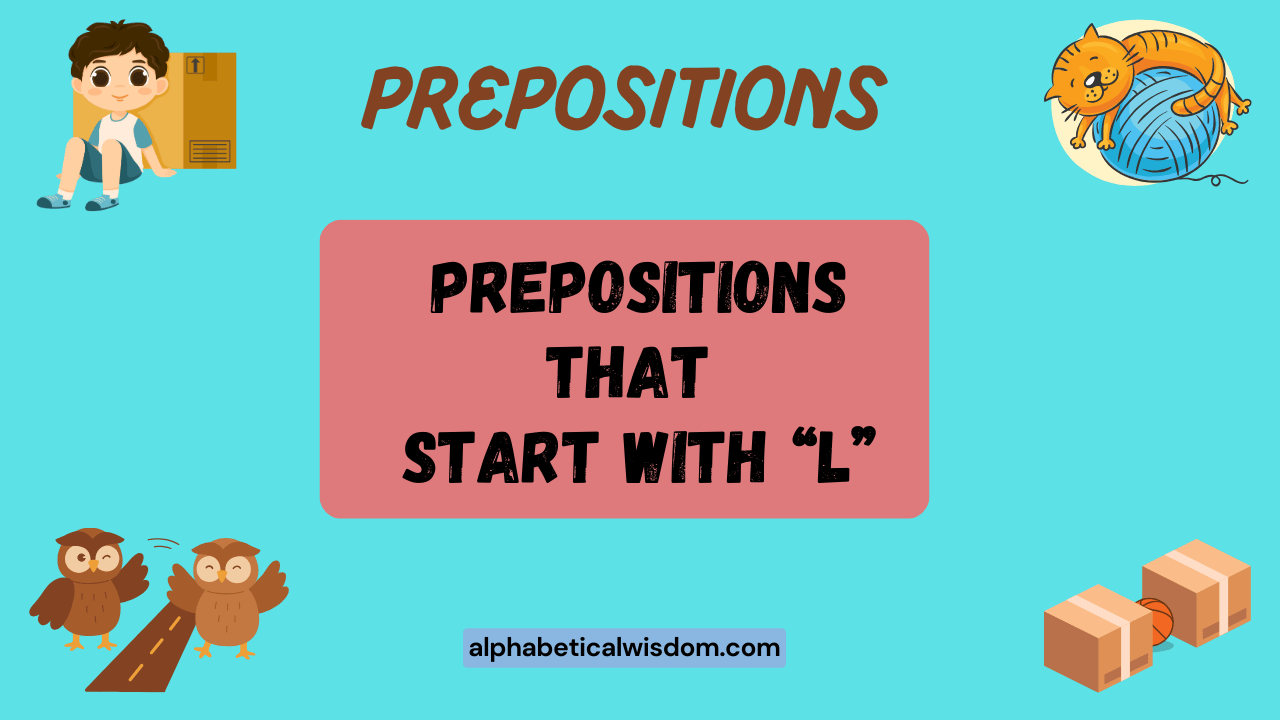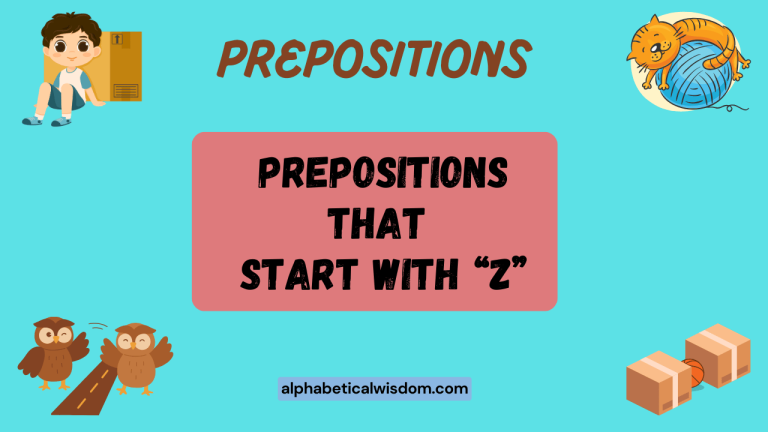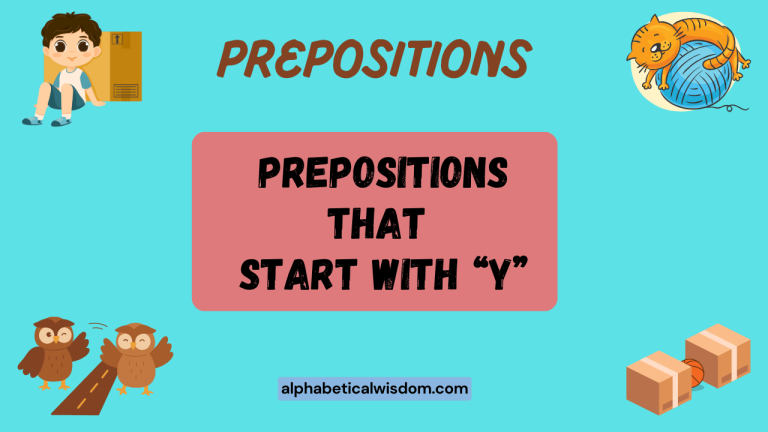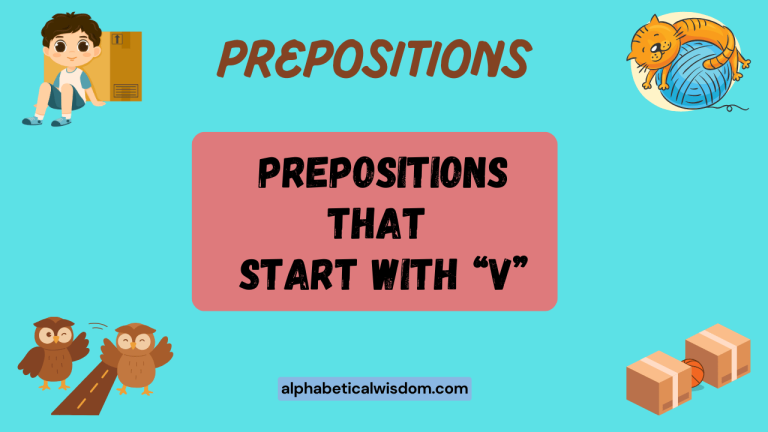Prepositions Starting with L: A Comprehensive Guide
Mastering prepositions is crucial for achieving fluency and accuracy in English. Prepositions, though small words, play a significant role in connecting nouns, pronouns, and phrases to other parts of a sentence.
This article focuses specifically on prepositions that begin with the letter “L,” providing a detailed exploration of their meanings, usage rules, common mistakes, and practical exercises. Whether you are a beginner or an advanced learner, this guide will enhance your understanding and application of these essential prepositions, helping you communicate more effectively and confidently.
Table of Contents
- Introduction
- Definition of Prepositions
- Structural Breakdown
- Types and Categories of Prepositions
- Examples of Prepositions Starting with L
- Usage Rules
- Common Mistakes
- Practice Exercises
- Advanced Topics
- FAQ
- Conclusion
Definition of Prepositions
A preposition is a word that connects a noun, pronoun, or noun phrase to other words in a sentence. It typically indicates the relationship between the noun or pronoun and other elements of the sentence, often expressing location, direction, time, or manner. Prepositions are essential for building clear and coherent sentences, as they provide context and specify the roles of different components within the sentence.
Prepositions are classified as a type of function word, meaning they serve a grammatical purpose rather than carrying significant lexical content on their own. They are typically followed by a noun phrase, which is called the object of the preposition. The preposition and its object together form a prepositional phrase, which can function as an adjective or an adverb within the sentence.
The primary function of a preposition is to show the relationship between the noun or pronoun and another word in the sentence. This relationship can be spatial (e.g., in, on, under), temporal (e.g., before, after, during), or abstract (e.g., of, for, with). The specific meaning of a preposition often depends on the context in which it is used. For example, the preposition “on” can indicate location (the book is on the table), time (on Monday), or a state (on fire).
Structural Breakdown
The basic structure involving a preposition is straightforward: Preposition + Noun Phrase (Object of the Preposition). This combination forms a prepositional phrase. Let’s break down the structure with examples using prepositions starting with “L”:
Consider the sentence: “He looks like his father.” Here, “like” is the preposition, and “his father” is the noun phrase (object of the preposition). Together, “like his father” forms the prepositional phrase, which functions as an adverb modifying the verb “looks.”
Another example: “The project is nothing less than a success.” In this case, “less than” functions as a compound preposition, and “a success” is the object of the preposition. The entire phrase “less than a success” acts as an adjective describing “project”.
A prepositional phrase can also be embedded within another phrase, creating more complex sentence structures. For instance: “The man lacking experience was not hired.” Here, “lacking experience” acts as an adjectival phrase modifying “man”.
Understanding this basic structure helps in correctly identifying and using prepositions in various contexts. Recognizing the object of the preposition is also crucial for avoiding common grammatical errors, such as using the incorrect case for pronouns (e.g., saying “like I” instead of “like me”).
Types and Categories of Prepositions
While the number of prepositions starting with “L” is limited, it’s important to understand how they can be categorized based on their function and meaning. They can be broadly categorized as follows:
Simple Prepositions
These are single-word prepositions. Examples include “like” and “less.”
Compound Prepositions
These are phrases that function as a single preposition. An example is “less than.”
Prepositions of Comparison
These prepositions are used to make comparisons. “Like” and “less than” often fall into this category.
Prepositions of State
These prepositions describe a state or condition. “Lacking” can sometimes be used in this way.
It’s important to note that a single preposition can fall into multiple categories depending on the context. For example, “like” can be a preposition of comparison or a preposition indicating similarity.
Examples of Prepositions Starting with L
This section provides extensive examples of sentences using prepositions starting with “L,” categorized for clarity.
Examples Using “Like”
The preposition “like” is commonly used to express similarity or comparison.
The following table shows examples of “like” used as a preposition in various sentence structures.
| No. | Sentence | Explanation |
|---|---|---|
| 1 | She sings like an angel. | “Like” compares her singing to that of an angel. |
| 2 | He looks like his older brother. | “Like” compares his appearance to his brother’s. |
| 3 | The weather feels like summer. | “Like” compares the current weather to summer weather. |
| 4 | This tastes like chicken. | “Like” compares the taste to chicken. |
| 5 | They act like children. | “Like” compares their behavior to that of children. |
| 6 | She dresses like a celebrity. | “Like” compares her style to that of a celebrity. |
| 7 | He runs like the wind. | “Like” compares his speed to the wind. |
| 8 | It sounds like rain. | “Like” compares the sound to rain. |
| 9 | She feels like she’s dreaming. | “Like” indicates a feeling of being in a dream. |
| 10 | He talks like a professor. | “Like” compares his manner of speaking to a professor’s. |
| 11 | The car drives like a dream. | “Like” compares the driving experience to a dream. |
| 12 | She dances like a professional. | “Like” compares her dancing ability to a professional’s. |
| 13 | He fights like a lion. | “Like” compares his fighting ability to a lion’s. |
| 14 | She works like a machine. | “Like” compares her work ethic to that of a machine. |
| 15 | The painting looks like a masterpiece. | “Like” compares the painting’s appearance to a masterpiece. |
| 16 | He sings like a pop star. | “Like” compares his singing to that of a pop star. |
| 17 | She cooks like a chef. | “Like” compares her cooking skills to those of a chef. |
| 18 | He swims like a fish. | “Like” compares his swimming ability to a fish. |
| 19 | She writes like a novelist. | “Like” compares her writing style to that of a novelist. |
| 20 | He leads like a general. | “Like” compares his leadership to that of a general. |
| 21 | The fabric feels like silk. | “Like” compares the fabric’s texture to silk. |
| 22 | She designs like an architect. | “Like” compares her design skills to an architect’s. |
| 23 | He jumps like a kangaroo. | “Like” compares his jumping ability to a kangaroo’s. |
| 24 | She plans like a strategist. | “Like” compares her planning skills to a strategist’s. |
| 25 | The engine sounds like a tractor. | “Like” compares the engine’s sound to a tractor’s. |
| 26 | He eats like a horse. | “Like” compares his eating habits to a horse’s. |
| 27 | She glides like a swan. | “Like” compares her gliding motion to a swan’s. |
| 28 | He snores like a chainsaw. | “Like” compares his snoring sound to a chainsaw’s. |
| 29 | She shines like a star. | “Like” compares her radiance to a star’s. |
| 30 | He thinks like a scientist. | “Like” compares his thought process to a scientist’s. |
Examples Using “Less”
The preposition “less” is typically used in the phrase “less than” to indicate a smaller amount or degree.
The following table shows examples of “less than” used as a prepositional phrase in various sentence structures.
| No. | Sentence | Explanation |
|---|---|---|
| 1 | The cost was less than expected. | “Less than” indicates the cost was lower than the expectation. |
| 2 | He earns less than his colleague. | “Less than” indicates he earns a smaller amount compared to his colleague. |
| 3 | She spent less than an hour on the project. | “Less than” indicates she spent a shorter time than an hour. |
| 4 | The damage was less than anticipated. | “Less than” indicates the damage was lower than what was anticipated. |
| 5 | The crowd was less than a hundred people. | “Less than” indicates the crowd size was smaller than one hundred. |
| 6 | The weight is less than five kilograms. | “Less than” indicates the weight is lighter than five kilograms. |
| 7 | The distance is less than a mile. | “Less than” indicates the distance is shorter than a mile. |
| 8 | The temperature is less than freezing. | “Less than” indicates the temperature is below freezing point. |
| 9 | The risk is less than minimal. | “Less than” indicates the risk is extremely low. |
| 10 | The effort required is less than strenuous. | “Less than” indicates the effort needed is not very demanding. |
| 11 | His involvement was less than significant. | “Less than” suggests his participation was not very important. |
| 12 | The impact was less than devastating. | “Less than” indicates the impact was not severely damaging. |
| 13 | Her reaction was less than enthusiastic. | “Less than” suggests her response was not very excited. |
| 14 | The delay was less than a day. | “Less than” indicates the delay was shorter than one day. |
| 15 | The investment is less than ten thousand dollars. | “Less than” indicates the invested amount is below $10,000. |
| 16 | The error was less than critical. | “Less than” indicates the mistake was not severely important. |
| 17 | The wait was less than five minutes. | “Less than” indicates the waiting time was shorter than five minutes. |
| 18 | The complexity is less than overwhelming. | “Less than” suggests the complexity is not very difficult. |
| 19 | The demand is less than anticipated. | “Less than” indicates the demand is lower than expected. |
| 20 | The side effects are less than severe. | “Less than” indicates the side effects are not very serious. |
| 21 | The problem is less than complicated. | “Less than” suggests the issue is not very complex. |
| 22 | The supply is less than adequate. | “Less than” indicates the supply is not sufficient. |
| 23 | The control is less than complete. | “Less than” suggests the control is not fully comprehensive. |
| 24 | The success was less than total. | “Less than” indicates the success was not a complete achievement. |
| 25 | The improvement is less than remarkable. | “Less than” suggests the improvement is not very significant. |
| 26 | The adherence was less than strict. | “Less than” indicates the adherence was not very rigorous. |
| 27 | The visibility was less than optimal. | “Less than” suggests the visibility was not ideal. |
| 28 | The security is less than robust. | “Less than” indicates the security is not very strong. |
| 29 | The evidence is less than conclusive. | “Less than” suggests the evidence is not fully definitive. |
| 30 | The resistance was less than expected. | “Less than” indicates the resistance was lower than anticipated. |
Examples Using “Leaving”
While “leaving” is primarily a verb, it can function as a preposition in certain participial phrase constructions, indicating a state or condition resulting from departure or absence.
The following table shows how “leaving” can function within participial phrases that act prepositionally, indicating a state of absence or result.
| No. | Sentence | Explanation |
|---|---|---|
| 1 | Leaving his family behind, he embarked on a solo journey. | “Leaving his family behind” indicates the state of his family being left. |
| 2 | Leaving the door open, she went outside. | “Leaving the door open” describes the state of the door being open as a result of her action. |
| 3 | Leaving all doubts aside, he decided to proceed. | “Leaving all doubts aside” indicates the state of having set aside all doubts. |
| 4 | Leaving a trail of clues, the detective solved the case. | “Leaving a trail of clues” describes the action that led to the case being solved. |
| 5 | Leaving a message on the table, she left the house. | “Leaving a message on the table” indicates the state of the message being left. |
| 6 | Leaving his mark on history, the leader changed the world. | “Leaving his mark on history” describes the lasting impact of his actions. |
| 7 | Leaving no stone unturned, they searched for the missing item. | “Leaving no stone unturned” indicates a comprehensive and thorough search. |
| 8 | Leaving a legacy of kindness, she was remembered fondly. | “Leaving a legacy of kindness” describes the positive impact she had on others. |
| 9 | Leaving everything to chance, he took a gamble. | “Leaving everything to chance” indicates a reliance on luck or fate. |
| 10 | Leaving the audience in awe, the performer took a bow. | “Leaving the audience in awe” describes the impact of the performance. |
| 11 | Leaving a detailed plan, they ensured a smooth transition. | “Leaving a detailed plan” indicates preparation for a seamless change. |
| 12 | Leaving a bad taste in her mouth, the experience soured her mood. | “Leaving a bad taste in her mouth” describes the negative impact of the experience. |
| 13 | Leaving a question unanswered, the professor ended the lecture. | “Leaving a question unanswered” indicates an unresolved issue at the end of the lecture. |
| 14 | Leaving a lasting impression, his speech resonated with everyone. | “Leaving a lasting impression” describes the impactful nature of the speech. |
| 15 | Leaving all worries behind, they enjoyed their vacation. | “Leaving all worries behind” indicates a state of relaxation and freedom from concerns. |
| 16 | Leaving the project unfinished, he moved on to other tasks. | “Leaving the project unfinished” describes the state of the project being incomplete. |
| 17 | Leaving a gap in the market, the company closed down. | “Leaving a gap in the market” indicates a void created by the company’s closure. |
| 18 | Leaving a debt unpaid, he faced serious consequences. | “Leaving a debt unpaid” describes the state of owing money. |
| 19 | Leaving his name on the document, he confirmed his approval. | “Leaving his name on the document” indicates the act of signing and confirming. |
| 20 | Leaving a void in their hearts, his departure was deeply felt. | “Leaving a void in their hearts” describes the emotional impact of his leaving. |
Examples Using “Lacking”
Similar to “leaving,” “lacking” is primarily a verb but can function within participial phrases that act prepositionally, indicating a state of deficiency or absence of something.
The following table illustrates how “lacking” can function within participial phrases to express a state of deficiency.
| No. | Sentence | Explanation |
|---|---|---|
| 1 | Lacking experience, he was not hired for the job. | “Lacking experience” indicates the absence of experience. |
| 2 | Lacking funds, they had to postpone the project. | “Lacking funds” indicates the absence of sufficient financial resources. |
| 3 | Lacking evidence, the case was dismissed. | “Lacking evidence” indicates the absence of proof. |
| 4 | Lacking support, the initiative failed. | “Lacking support” indicates the absence of backing or encouragement. |
| 5 | Lacking confidence, she hesitated to speak. | “Lacking confidence” indicates the absence of self-assurance. |
| 6 | Lacking resources, they struggled to complete the task. | “Lacking resources” indicates the absence of necessary supplies or materials. |
| 7 | Lacking direction, they wandered aimlessly. | “Lacking direction” indicates the absence of a clear path or goal. |
| 8 | Lacking knowledge, he made several mistakes. | “Lacking knowledge” indicates the absence of information or understanding. |
| 9 | Lacking motivation, he procrastinated on his work. | “Lacking motivation” indicates the absence of drive or enthusiasm. |
| 10 | Lacking communication, the team faced many problems. | “Lacking communication” indicates the absence of effective exchange of information. |
| 11 | Lacking planning, the event was disorganized. | “Lacking planning” indicates the absence of structured preparation. |
| 12 | Lacking foresight, they made a poor decision. | “Lacking foresight” indicates the absence of anticipating future outcomes. |
| 13 | Lacking creativity, the design was uninspired. | “Lacking creativity” indicates the absence of originality or innovation. |
| 14 | Lacking discipline, he failed to meet his goals. | “Lacking discipline” indicates the absence of self-control and order. |
| 15 | Lacking focus, she struggled to concentrate. | “Lacking focus” indicates the absence of sustained attention. |
| 16 | Lacking clarity, the instructions were confusing. | “Lacking clarity” indicates the absence of clear and understandable information. |
| 17 | Lacking precision, the measurements were inaccurate. | “Lacking precision” indicates the absence of accuracy and exactness. |
| 18 | Lacking efficiency, the process was time-consuming. | “Lacking efficiency” indicates the absence of streamlined and effective procedures. |
| 19 | Lacking innovation, the product failed to attract customers. | “Lacking innovation” indicates the absence of new and original features. |
| 20 | Lacking integrity, he lost the trust of his colleagues. | “Lacking integrity” indicates the absence of honesty and moral principles. |
Usage Rules
Understanding the specific usage rules for each preposition is crucial for accurate and effective communication. Here’s a breakdown of the key rules for the prepositions discussed:
“Like” vs. “As”
A common point of confusion is the difference between “like” and “as.” “Like” is a preposition and should be followed by a noun or pronoun. “As” is a conjunction and should be followed by a clause (a subject and a verb).
- Correct: He sings like an angel. (“angel” is a noun)
- Incorrect: He sings as an angel.
- Correct: He sings as he did last night. (“he did last night” is a clause)
“Less Than” vs. “Fewer Than”
“Less than” is used with uncountable nouns, while “fewer than” is used with countable nouns.
- Correct: There is less than a gallon of milk left. (“milk” is uncountable)
- Correct: There are fewer than ten apples in the basket. (“apples” are countable)
- Incorrect: There is fewer than a gallon of milk left.
- Incorrect: There are less than ten apples in the basket.
Participial Phrases (“Leaving” and “Lacking”)
When using “leaving” or “lacking” in participial phrases, ensure the phrase logically modifies the subject of the main clause. The action or state described by the participial phrase should be directly related to the subject’s action or state.
- Correct: Leaving the door unlocked, she went to the store. (She left the door unlocked.)
- Correct: Lacking proper training, he made several mistakes. (He lacked proper training.)
- Incorrect: Leaving the door unlocked, the cat escaped. (The cat did not leave the door unlocked.)
- Incorrect: Lacking proper training, the report was poorly written. (The report did not lack training.)
Common Mistakes
Even experienced English speakers sometimes make mistakes with prepositions. Here are some common errors to watch out for:
| Incorrect | Correct | Explanation |
|---|---|---|
| He looks as his brother. | He looks like his brother. | “Like” is the correct preposition for comparison. |
| There are less students in the class today. | There are fewer students in the class today. | “Fewer” is used with countable nouns like “students.” |
| Leaving the house, it started to rain. | Leaving the house, she noticed it started to rain. | The participial phrase must logically modify the subject. |
| Lacking funds, the decision to postpone the trip was taken. | Lacking funds, they took the decision to postpone the trip. | The participial phrase should directly relate to the subject’s action. |
| She sings good like an angel. | She sings well like an angel. | “Well” is the adverb form to modify the verb “sings.” |
Practice Exercises
Test your understanding with these practice exercises.
Exercise 1: Fill in the Blanks
Fill in the blanks with the appropriate preposition: “like,” “less than,” “leaving,” or “lacking.”
| No. | Sentence | Answer |
|---|---|---|
| 1 | He sings _______ a professional. | like |
| 2 | The cost was _______ we expected. | less than |
| 3 | _______ experience, she was not hired. | Lacking |
| 4 | _______ his keys, he had to break the window. | Leaving |
| 5 | She dances _______ a ballerina. | like |
| 6 | The weight is _______ 10 pounds. | less than |
| 7 | _______ proper preparation, the event was a disaster. | Lacking |
| 8 | _______ a note on the door, he went to the store. | Leaving |
| 9 | It feels _______ summer today. | like |
| 10 | The time taken was _______ anticipated. | less than |
Exercise 2: Correct the Errors
Identify and correct the errors in the following sentences.
| No. | Incorrect Sentence | Correct Sentence |
|---|---|---|
| 1 | He acts as a child. | He acts like a child. |
| 2 | There is less students in the class. | There are fewer students in the class. |
| 3 | Leaving the stove on, the house burned down. | Leaving the stove on, she caused the house to burn down. |
| 4 | Lacking resources, the project was impossible to do. | Lacking resources, they found the project impossible to do. |
| 5 | She sings good like an angel. | She sings well like an angel. |
| 6 | The cost was less that I thought. | The cost was less than I thought. |
| 7 | He felt like he was in a dream as he floated in the pool. | He felt as if he was in a dream as he floated in the pool. |
| 8 | Leaving her phone at home, the day became stressful. | Leaving her phone at home, she found the day became stressful. |
| 9 | Lacking motivation, the task was not completed by it. | Lacking motivation, they failed to complete the task. |
| 10 | She dresses as a celebrity. | She dresses like a celebrity. |
Exercise 3: Sentence Completion
Complete the following sentences using an appropriate prepositional phrase starting with “like,” “less than,” “leaving,” or “lacking.”
She dances ____________.
| No. | Incomplete Sentence | Possible Completion |
|---|---|---|
| 1 | He runs ____________. | like the wind. |
| 2 | The distance is ____________. | less than a mile. |
| 3 | ____________, the team faced many problems. | Lacking communication |
| 4 | ____________, she went to the beach. | Leaving her worries behind |
| 5 | like a professional. | |
| 6 | The temperature is ____________. | less than freezing. |
| 7 | ____________, the event was disorganized. | Lacking planning |
| 8 | ____________, he took a gamble. | Leaving everything to chance |
| 9 | He sings ____________. | like a pop star. |
| 10 | The delay was ____________. | less than a day. |
Advanced Topics
For advanced learners, it’s beneficial to understand the more nuanced aspects of prepositional usage. This includes:
- Prepositional Verbs: Understanding how prepositions combine with verbs to create new meanings (e.g., “look like,” “end up leaving”).
- Idiomatic Expressions: Recognizing and using common idiomatic expressions that involve prepositions (e.g., “feel like”).
- Formal vs. Informal Usage: Being aware of the differences in prepositional usage in formal and informal contexts.
- Cross-linguistic Comparisons: Comparing how prepositions are used in English versus other languages to avoid interference errors.
FAQ
What is the difference between “like” and “as”?
Answer: “Like” is a preposition used to compare nouns or pronouns, while “as” is a conjunction used to introduce clauses.
When should I use “less than” vs. “fewer than”?
Answer: Use “less than” with uncountable nouns and “fewer than” with countable nouns.
Can “leaving” and “lacking” be used as prepositions?
Answer: While primarily verbs, “leaving” and “lacking” can function within participial phrases that act prepositionally, indicating a state or condition.
How can I improve my preposition usage?
Answer: Practice regularly, pay attention to context, and review common mistakes.
Conclusion
Mastering prepositions, including those starting with the letter “L,” is essential for clear and effective communication in English. By understanding their definitions, usage rules, and common mistakes, you can significantly improve your fluency and accuracy.
Consistent practice and attention to context will further enhance your ability to use these prepositions correctly and confidently. Keep practicing, and you’ll find your English skills continue to grow!






